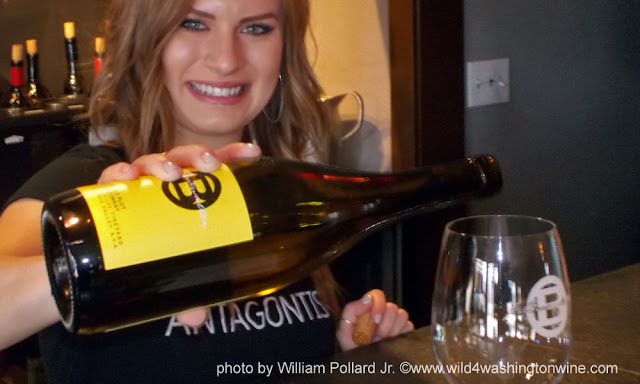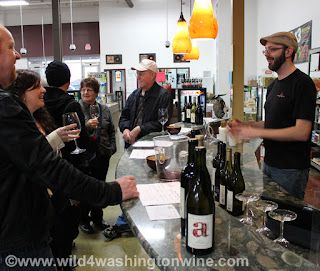 |
| Be nice to your wine hostess and ask her questions about the wine and winery. |
Part of an ongoing series on visiting Washington wine country.
Are you going wine tasting? Here's what you need to know when visiting a winery tasting room.
1. Wine Tasting is not Drinking
Going wine tasting it is about tasting wine, not drinking. Some people you bump into at the wineries are going for volume - bad form.
2. Tasting Fee
Many wineries do have a tasting room fee of about $5. Be prepared to pay to taste - be thankful if the winery you visit has no tasting fee (some wineries discount the tasting fee from your purchase - bonus). A modest tasting fee does help defray the cost of pouring wine - it also helps to discourage those out just for a buzz.
 |
| Ask questions and enjoy. |
3. Ask Questions
If you are going to the effort of visiting wine country, then ask questions while you are at the winery. Who made the wine? What is in the bottle? How old is the winery? Etc. This is your opportunity to educate yourself about the winery, wine and wine industry. Ask and learn!
4. Spitting is Okay
If you don't like the wine in your glass, you are not obligated to drink it. There should be a dump bucket on the counter where you can dump the wine you don't want to drink. If you are talented, and careful, you can also spit the wine into the bucket.
5. Tasting Process
Once the wine is poured in your glass, there is a *process to the tasting:
*Note: It is common practice among the experienced tasters to hold the glass by the stem (no fingerprints on the glass, no hand warming the wine in the glass, and it is easier to swirl the wine by holding the stem).
**Note: Experienced tasters also bring a bottle of water - stay hydrated.
***Note: Don't drink and drive. If you lack a designated driver, then take breaks between wineries to re-hydrate and eat some food. We want everyone to have a safe and positive wine experience.
 |
| Colors of three Col Solare wines. |
a) Check Color and Clarity - Color
Look at the color of the wine. Is it clear, dark, cloudy, golden, red, or brownish? There are ranges of color by varietal and age.
b) Release the Aroma - Smell
Swirl the wine in the glass to release the aroma of the wine, and then smell the wine. What do you smell? Swirl and smell again. Don't rush this part of the process - I often wander around the tasting room with my wine, swirling, smelling and generally taking time to appreciate how it smells.
 |
| Taste and appreciate the wine. |
c) Taste the Wine - Flavor
Don't drink your wine in one swallow. Leave some wine in your glass for another taste - sips please.
Did you like it? Why?
There are essentially three aspects of the wine you are analyzing when you taste: beginning (attack), middle (mid-palate), and end (the finish). A well-balanced wine will be complimentary all the way through smell, attack, mid-palate and the finish. Smell and taste are related, so hopefully the wine shows this in a way you appreciate.
*Note: Here's a video of me tasting a bottle of wine. Note how I smell the cork, swirl the wine, smell the wine and then taste the wine. And I hold the glass by the stem.
You don't have to describe the wine you taste. You could take detailed tasting notes as I do, but you don't have to. The more wine you taste, the better your palate will become at describing what you taste. What is most important about wine tasting is finding wine you enjoy and want to take home.
 |
| Some bottles are available only at the winery. |
6. Buy a Bottle or a Case
Must you buy a bottle? Even if you don't like any of the wines? Yes! Except, you are not obligated to buy wine if you paid for the tasting. It is common courtesy to say thank you for the wine and the conversation by purchasing a bottle of wine. It's up to you to decide how good the wines and the experience were. This is also a good way to add to your collection of memories. And remember, when you purchase direct from the winery, you are buying from the source.
7. Tipping
Should you tip? Most wineries don't expect tips. Most people don't tip the hostess/host at the tasting room (I should know). But think on this. Don't you always tip when you eat at restaurants? I see coffee baristas getting tipped all the time for $5 cups of Joe. Why is it people don't feel obligated to tip after buying $30, $100 or even $1,500 of wine? Even after all the great conversation and information I shared? Ah - you don't have to tip - unless you want to - it's up to you.
 |
| Have fun! |
8. Notes
Try to take some mental notes, if not written notes. I do. I'll even record notes on my cell phone if I don't have paper to write on. Your notes will become valuable reminders of the wines you enjoyed, so you can buy more later. And remember to tell friends.
9. Have Fun
You should find at least one wine you like at the wineries you visit. I always do. If you find yourself obsessing about Washington wine, holding blind tastings with friends and rambling on and on about your latest discovery, then you are now Wild 4 Washington Wine. Have you considered contributing to a wine blog? Fire off an email or tweet me if you do.
Cheers!